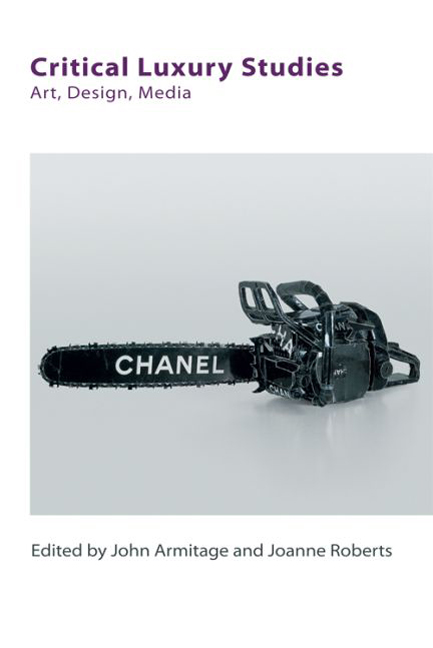Book contents
- Frontmatter
- Contents
- List of Figures
- List of Tables
- Series Editors’ Preface
- Acknowledgements
- Notes on Contributors
- 1 Critical Luxury Studies: Defining a Field
- I CRITICAL LUXURY STUDIES
- II ART, DESIGN, MEDIA
- 7 Experiments in Suchness: Hiroshi Sugimoto's Silk Shiki for Hermès
- 8 Libeskind in Las Vegas: Reflections on Architecture as a Luxury Commodity
- 9 Sartorial Connoisseurship, the T-Shirt and the Interrogation of Luxury
- 10 Online Luxury: Geographies of Production and Consumption and the Louis Vuitton Website
- Index
9 - Sartorial Connoisseurship, the T-Shirt and the Interrogation of Luxury
from II - ART, DESIGN, MEDIA
Published online by Cambridge University Press: 23 September 2017
- Frontmatter
- Contents
- List of Figures
- List of Tables
- Series Editors’ Preface
- Acknowledgements
- Notes on Contributors
- 1 Critical Luxury Studies: Defining a Field
- I CRITICAL LUXURY STUDIES
- II ART, DESIGN, MEDIA
- 7 Experiments in Suchness: Hiroshi Sugimoto's Silk Shiki for Hermès
- 8 Libeskind in Las Vegas: Reflections on Architecture as a Luxury Commodity
- 9 Sartorial Connoisseurship, the T-Shirt and the Interrogation of Luxury
- 10 Online Luxury: Geographies of Production and Consumption and the Louis Vuitton Website
- Index
Summary
At first glance, everything looked the same. It wasn't. Something evil had taken possession of the town.
Luxury is parasitic. In its action it is carcinogenic, colonising the host's body, replicating its vital organs, making itself indispensable, often undetectable, debilitating and frequently terminal. From handbags to hotels, excursions to enemas, luxury's contemporary colonisation is irresistible, infecting the very discourse we use, as terms such as luxury for all, luxury for less, stealth luxury, affordable luxury and even luxury lite pass unchallenged and are employed to camouflage luxury's essentially socially dichotomous function within a deceptive membrane of inevitability.
This text will explore the invasive action of contemporary luxury production and consumption, and in order to understand its selective and often initially unrecognisable progress, fashion will provide a suitable ‘host’ with which to more closely observe its characteristic stages. The basic plain white T-shirt, ubiquitous, instantly familiar and apparently simple, has provided a fertile vestimentary culture in which luxury's recent diversification and adaptation can be detected. A garment as democratic, modest and undistinguished would seem at first glance an unlikely target for luxury's conquest, and yet it is precisely because of its humble and unpretentious origins that luxury finds in it its ideal sartorial colony. But before considering luxury's insidious permeation of the plain white cotton T-shirt and why this subtle – to many, invisible – appropriation of an everyday item encapsulates its contemporary expansion, it is necessary to contextualise this within an understanding of the more easily assailable processes of refinement, embellishment and substitution.
Early in Christopher Berry's seminal text The Idea of Luxury he addresses luxury goods as typically understood as often having undergone a process of refinement and ornamentation. This is not to say that they lose their original function, indeed preserving their basic utility is essential to their status as luxury goods, but the apparent superfluity of added qualities such as lustre, softness or transparency, to choose typical qualities attached to luxury textiles for example, is an essential part of their recognition as luxury goods. As Berry suggests, ‘The refinements that characterise luxuries are the qualitative or adjectival aspects of goods’ (1994: 11).
- Type
- Chapter
- Information
- Critical Luxury StudiesArt, Design, Media, pp. 177 - 198Publisher: Edinburgh University PressPrint publication year: 2016



